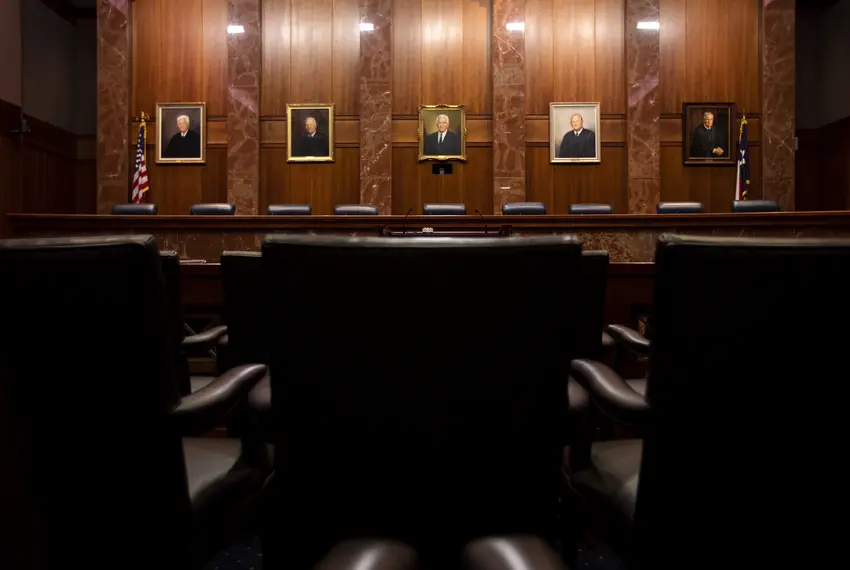- January 15, 2025
When is a business to blame for over-serving? Texas Supreme Court weighs the line in drunk driving case

By Pavan Acharya, The Texas Tribune
“When is a business to blame for over-serving? Texas Supreme Court weighs the line in drunk driving case” was first published by The Texas Tribune, a nonprofit, nonpartisan media organization that informs Texans — and engages with them — about public policy, politics, government and statewide issues.
Sign up for The Brief, The Texas Tribune’s daily newsletter that keeps readers up to speed on the most essential Texas news.
The Texas Supreme Court heard arguments Monday on a case about whether a business can be held liable under state law for drunk driving-related injuries caused by a customer, even if other attendees at that business said the customer did not appear to be physically intoxicated.
Barrie Myers is suing Cadot Restaurant in Dallas for allegedly over-serving alcohol to a Texas man, Nasar Khan, who rear-ended her vehicle in November 2018 while intoxicated. When taken to a nearby hospital later that night, Khan’s blood alcohol content was found to be 0.139%, higher than the 0.08% required to be legally intoxicated. Khan later testified that a few hours before the crash, he had three or four drinks while dining at Cadot with a friend.
Myers is seeking for the case to go to trial. A favorable ruling for Myers could further strengthen an existing state law meant to hold businesses accountable for over-serving alcohol to already intoxicated patrons.
Myers sued Cadot under the Texas Dram Shop Act, a law passed in 1987 that allows drunk driving victims to sue businesses that serve alcohol to a person that is “obviously intoxicated to the extent that he presented a clear danger to himself and others.” Texans who have been victims of drunk driving incidents have sought relief under the state law for decades, sometimes being awarded large sums.
The Texas Dram Shop Act also protects those who suffer a “personal injury or property damage” as a result of an intoxicated individual’s actions. Texas is one of 42 states with similar laws. Washington, D.C. has one as well.
In September 2021, a district court in Dallas sided with Cadot and ruled out a trial. But almost two years later in July 2023, a state court of appeals reversed the lower court’s decision saying Myers’ question of whether Khan was “obviously intoxicated” while dining at Cadot was a valid one.
Cadot then petitioned the case to go to the Texas Supreme Court, asking the justices to reverse the court of appeals’ decision allowing the case to go to trial.
Oral arguments on Monday at the Supreme Court centered on whether it was reasonably apparent that Khan was intoxicated while he was at Cadot.
Steven Knight, a Houston-based lawyer representing Cadot, argued that “everybody who saw [Khan] at the restaurant testified that he exhibited no signs of drunkenness.”
He also pressed that liability under the Texas Dram Shop Act is based on how an individual appears when they were served alcohol, not the number of drinks they were served during a given period. Several justices were skeptical of this argument, including newly appointed Justice James Sullivan.
“Suppose that the Cadot bartender lined up 100 shots of tequila, or some other bad idea, lined them all up and watched Khan drink every single one of them,” Sullivan said. “Why is that not enough within the meaning of the statute, to make it apparent to the provider that the individual was obviously intoxicated to the extent that he presented a clear and present danger to himself and others?”
Matthew Kita, an attorney representing Myers, argued that Khan’s intoxication would have been more than apparent given his high blood alcohol content recorded hours later. “Something can be apparent and also be ignored,” he said.
Kita added that an individual bartender who has received training from the state could fully understand the impact different levels of alcohol can have on a person and that they could “also be lying about what they saw when they served the drink.” He also cited deposition testimony in which Khan said he was over-served that November evening and that the person serving him at Cadot should have observed he was intoxicated.
In addition, Kita raised doubts about whether Khan had just three to four drinks at Cadot. A petition Kita filed to the Court in late 2023 argued that Khan would have had to have 11 to 19 “standard drinks” to reach the blood alcohol content recorded later that night. Khan has previously testified that he did not drink alcohol anywhere besides Cadot that evening.
“The evidence that he obtained additional drinks is the fact that it’s impossible for him to have only had four drinks in that window and have a blood alcohol content at .13 at 3 o’clock in the morning,” Kita said.
The Supreme Court of Texas is expected to rule on the case before its term wraps up at the end of June.
This article originally appeared in The Texas Tribune at https://www.texastribune.org/2025/01/13/texas-supreme-court-drunk-driving/.
The Texas Tribune is a member-supported, nonpartisan newsroom informing and engaging Texans on state politics and policy. Learn more at texastribune.org.

